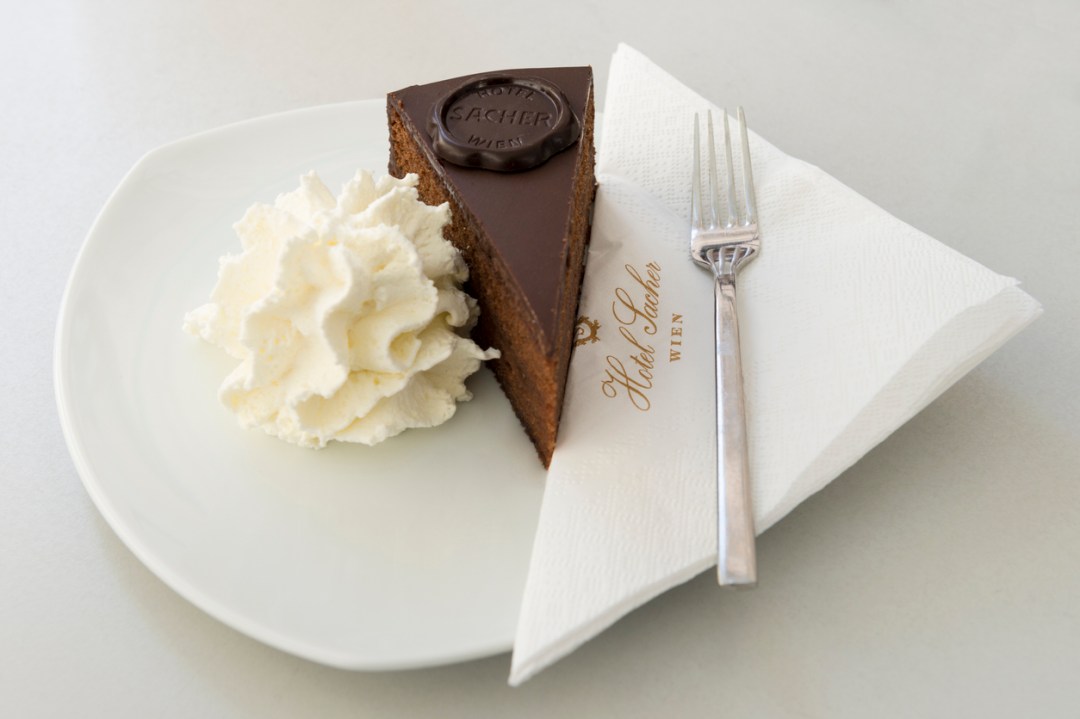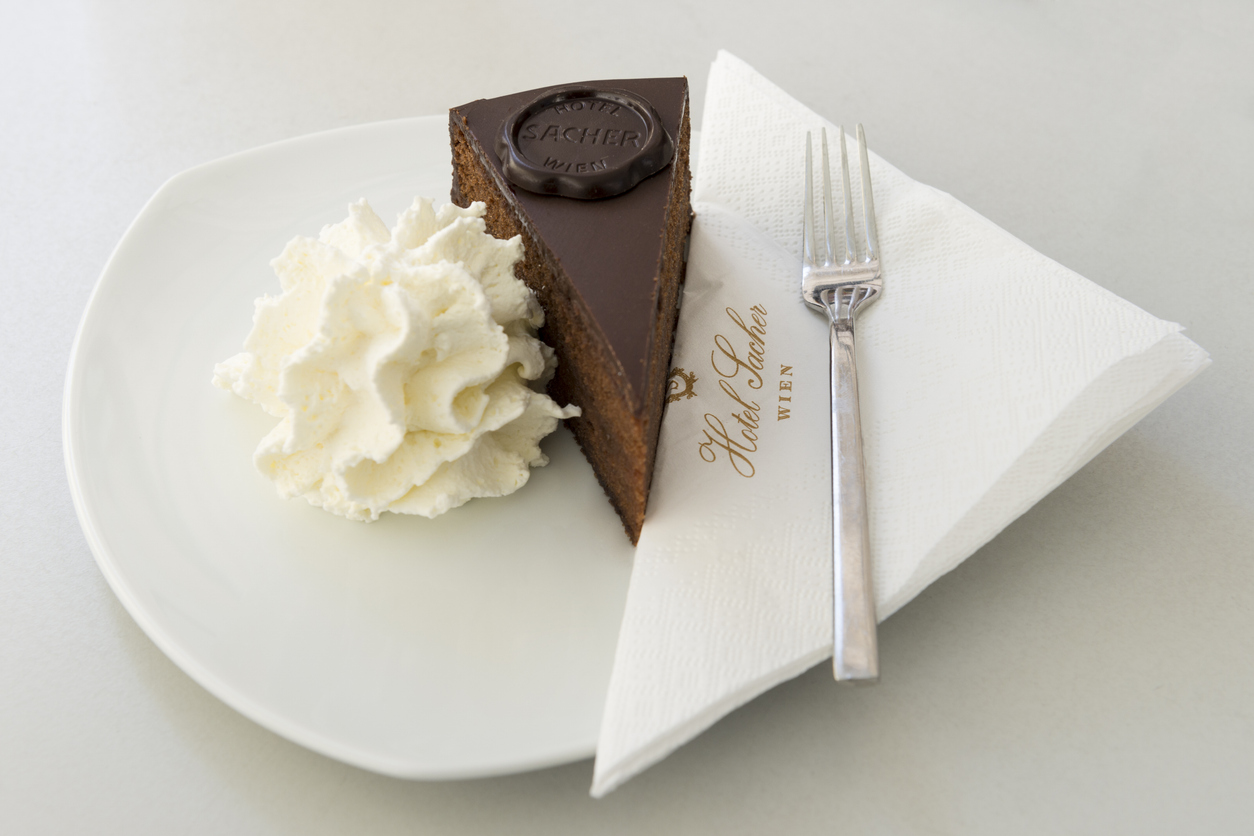On a recent trip with my daughter to Trieste, the north Italian seaside city on the border with Slovenia, I thought it would be nice to take her to Café Sacher for some sachertorte, which has been in culinary fashion since its creation in 1832. Trieste, once a thriving Austro-Hungarian port, is as reminiscent of Vienna as it is of Italy, and to eat this famous Austrian cake in the establishment of the same name would, I thought, be an experience my chocolate-loving daughter would remember. Sachertorte is nothing fancy compared to other Viennese cakes – merely a dark sponge with some apricot jam filling and coated in a layer of smooth chocolate, but that plainness is part of its charm.
Much of life, perhaps most of it, is a constant cycle of hype and disappointment
In Café Sacher itself, I guessed, it was bound to be rich, moist and, in its own simple way, luxurious. Trieste’s branch, though no match for its Viennese counterpart, and only opened (to my disappointment) in 2023, is still a sumptuous place to sit in, with its red velvet banquettes, globe lights and abundance of pinkish marble. Besides, it was raining and the Bora – the notoriously gusty Trieste wind – was blowing in off the Adriatic. It was scarcely a day for walking along the coast to Miramare, the nearby castle.
Of course, it didn’t go as planned. As there were just two of us, we were jammed onto a poky little table while the window seats (for four) went empty. This seemed reasonable enough – Sacher, after all, is a business – but when our order still hadn’t appeared, on a relatively sluggish day, after a dozen or so minutes, I began to grouse a little. Sachertorte in Café Sacher was €9.90 a slice, and I guessed it had cost a tiny fraction of that to make the thing. If you couldn’t get good table service in a place like this – where you hope the waiters will dress in aprons, muse sagely about ‘the Balkan issue’ and quote Rilke at you – then surely we could save our money and get strudel down the road.
When the 15-minute mark arrived and we were still sachertorteless, we put on our jackets and left. Later we looked on Tripadvisor, to find out whether we’d been unreasonable and what we’d missed. Many reviews were damning: ‘Avoid at all costs if you won’t want to pay for a [sic] overpriced dry Sacher cake,’ said one, ‘Not to mention rude waiters. You can buy better Sacher cake in a nearby market store.’
‘Horrendous Service,’ said ‘Frequent Traveller.’ ‘Such a disappointing visit after much anticipated hype… Two tables stood up and left when no one bothered to serve them.’ ‘Run by clumsy and unkind characters,’ sniffed Michele R, while Corrado P. from Reggio Emilia writes, ‘A dry cake, poor and really gruesome service.’ My daughter and I began to feel a little less sheepish.
But that dry sachertorte from Sacher set me off thinking about other disillusionments in life. In 2023 I bought a Swiss watch I’d long coveted by a famous maker. It’s already stopped working and gone in for repair. There were the loafers from a respected Mayfair shoe shop (established in 1873) which fell apart within a year, shirts from a Jermyn Street shirtmaker whose collars frayed within two. I’d bought a pair of desert boots from the firm that invented them, only to find, a few weeks later, that the inside lining had chaffed through at the heels. I’d trusted these brands like I’d trusted Café Sacher, only to find they’d pulled the rug on me. Like the Volkswagen crisis of 2015 – when probably the most trusted mid-price car brand in the world was found to have cheated emissions tests – these tiny discoveries seemed to hint at a much more serious rot. Right across the board, it seemed, we were being played for fools by brands we relied on to be ‘the adults in the room.’
Much of life, perhaps most of it, is a constant cycle of hype and disappointment, something you quickly learn as a child. Anyone who bought a Slinky which knotted up after a few uses, believed the lies in X-Ray Specs adverts (‘You’ll see what she looks like naked!’) or, I’m told, actually sent away for those Sea Monkeys advertised in DC Comics, quickly found out the gap between promise and reality. The same goes, later on, for Spanish carnivals, the Pyramids, the Prague astronomical clock, or much adult sex: crashing disappointments, all. As the Peggy Lee song goes, ‘Is that all there is?’
This is not to say that there aren’t thrills in life. One was Lake Baikal in Siberia, at which I assumed I’d simply shrug (‘just a great, big, boring lake’) but the sight of which was so magnificent it brought a lump to my throat. The first taste of duck pancakes with spring onion and plum sauce; Shostakovich’s music; the film of The Lives of Others; pastrami and Swiss cheese sandwiches or Kundera’s early novels. But by a certain time in life you assume, to avoid feeling gutted, that nearly everything is less than its reputation tells you.
Such discoveries await my daughter. When we’re not running out of Viennese-themed cafes, she and I watch Emily in Paris, her favourite series, where a peachy 20-something American girl hits the French capital and finds that through sheer perkiness it’s a succession of endlessly opening doors. (I don’t mention ‘Paris Syndrome’, that cosmic disappointment said to afflict Japanese tourists when they find the city of the Eiffel Tower and the Louvre Museum is one big letdown, and need counselling for it.) God help my daughter if she thinks that adult life (let alone Paris) is just like this. Because realising that it isn’t, as we all slowly do, is a lot more gruelling than munching your way through a dried out €9.90 sachertorte – and finding that it’s really little more than a maxed-out Jaffa Cake, albeit one with continental airs.








Comments